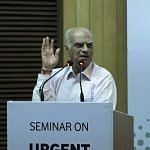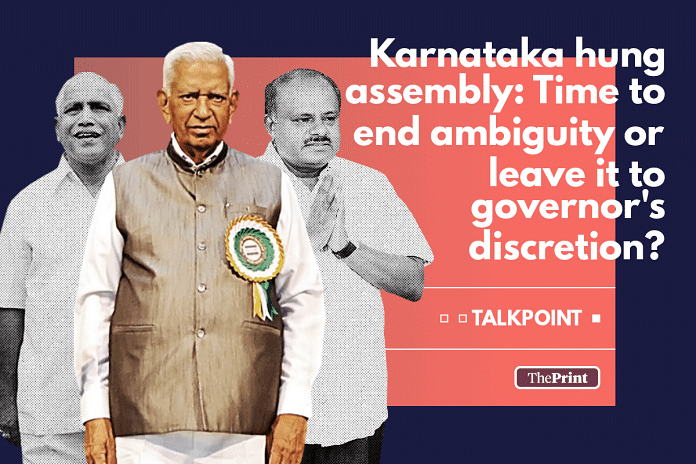With the Karnataka election results throwing up a hung assembly, it is now up to governor Vajubhai Vala to decide who he invites to form the government. Both the BJP and the Congress-JD (S) alliance have staked claim.
The Congress is quoting Goa and Manipur, where the single largest party was trumped to office by a coalition of smaller parties, as precedent to bolster its claim. It has also stated that it will approach the Supreme Court if the governor calls upon BJP to make the government.
ThePrint asks: Karnataka hung assembly: Time to end ambiguity or leave it to governor’s discretion?
Precedents are available, but Constitution says that governor will decide
 Subhash Kashyap
Subhash Kashyap
Constitutional expert
As a student of the Constitution, I find that there is no ambiguity at all. The Constitution is very clear; it is up to the governor to decide who will form the government in case of a hung assembly. As for precedents, all sorts are available.
We can’t just limit ourselves to Goa and Manipur. There are precedents of pre-poll alliances being invited to form the government, the largest single party being invited and even post-poll alliances. All this proves is that it is entirely up to the governor to decide who to appoint as CM.
Then, the candidate has to prove he/she has a majority on the floor of the house. It is usually done by a vote of confidence. In case this fails, the candidate will have to step down. In that case, the governor can call on a different person/party to form the government. If governor fails to find a person, then it is a case constitutional breakdown. President’s rule may be recommended.
When voting takes place, it is not a question of total number of members in the assembly. The rules dictate it has to be a majority of those present for voting in the assembly. If the majority is in favour of a confidence motion, then the government is safe. If they vote against the CM, then he has to go.
Also, we must note that anti-defection law applies in this case. If one votes or abstain from voting as per the party directive, they face the risk of disqualification. However, the vote that has been cast remains valid.
Governor not duty-bound to invite Congress & JD(s) to form govt
 Raghav Awasthy
Raghav Awasthy
Advocate, and member, RSS
Some misinformed speculation is doing the rounds to the effect that the governor is somehow duty bound to invite the Congress and the JD(S) to form the government in Karnataka. Precedent from Goa and Manipur is being cited in this regard.
It would be instructive to peruse some extremely important observations from the five-judge bench order in the case of Rameshwar Prasad vs. Union of India. In the said case, a five-judge bench of the Hon’ble Supreme Court, speaking through Justice Y.K. Sabharwal, quoting from the Sarkaria Commission report on Centre-state relations, has opined that in case no single party wins a majority, the first preference is given to a pre-poll alliance with the numbers. The second preference is to be given to the largest party, which has staked a claim to form the government.
It is only after the first two options have been exhausted that a post-poll alliance is considered.
In the present case, clearly there is no alliance that was formed prior to the elections. The Congress party says that the said precedent was not followed in Goa where the Congress emerged as the single largest party in 2017.
But there is a qualitative difference in what happened in Goa and the situation in Karnataka.
In Goa, the Congress, perhaps being wrongly advised by Digvijaya Singh, never even ‘staked’ a claim to form the government, which the BJP has promptly done in this case. In Manipur, it staked its claim only after the BJP did.
The Congress can obviously not blame the governor because it never staked the claim. The governor doesn’t have any discretion, there is no ambiguity whatsoever. The Congress is trying to create an impression of ambiguity by quoting precedents out of context.
In the present case, B.S. Yeddyurappa has already approached the governor and has staked a claim to form the government. The majority shall be ultimately tested on the floor of the House and if the Congress has faith in the integrity of their legislators, they should surely not be bothered at all. The same goes for the JD (S).
Based on Sarkaria Commission & Rameshwar Prasad judgment (2006), post-poll alliances seem to be first choice
N S Boparai
Advocate
The governor has the discretion to call on the single largest coalition or party to form the government, yes. The first preference goes to the pre-poll alliance, the second to the largest party and then the third to the post-poll alliance.
The issue as far as Karnataka is concerned is clear. The post-poll alliance has indicated that it has the requisite numbers to form the government. The single largest party prima facie is unable to show that it can muster the numbers to form the government.
Therefore, in all fairness, it should be the post-poll alliance that has to be called upon. The only way the largest party will be able to muster the numbers is either by horse-trading or defection. This is tantamount to circumventing the Constitution.
The governor has to satisfy himself, constitutionally speaking, that whichever party is called upon will form a stable government. The Congress-JD(S) alliance is visibly displaying that.
Moreover, based on Rameshwar Prasad v/s the Union of India (2006), the Sarkaria Commission report and the precedent set in Goa, Meghalaya and Manipur, post-poll alliances seem to be the first choice.
Either the BJP must show that it will be able to muster the numbers, or the governor must factor in the Congress-JD(S) alliance. The confidence in the new government may be tested on the floor of the house. In a situation where an alliance has already displayed the strength to form the government, there is no question of calling upon the BJP.
No ambiguity, governor must ensure that new govt enjoys confidence of legislative assembly
 S.K. Mendiratta
S.K. Mendiratta
Former legal advisor, Election Commission
India has only one Constitution and it is held as sacred. It governs all states, all governors, and essentially the entire country. The governor of Karnataka will also have to base his decision on this very Constitution of India.
There may be various precedents that have been set. But we expect the governor to not only peruse all of these, but also factor in the circumstances relevant to his own state while making a decision. We expect him to take the right decision.
The governor also has to ensure that the new council of ministers will enjoy the confidence of the legislative assembly. According to Article 164 of the Constitution, that is the only thing required of him. He must determine the right candidate to command a majority and run a stable government.
It is not advisable that we substitute our own perspectives over that of the governor. We must remember that once he begins his mandate, he is no longer a nominee. He is accountable and answerable to the people of India for the decisions he makes. He has taken an oath to uphold the Constitution of the country.
We must have some faith in the system and the governor. It is after all his job to make the right decision.
After Goa, Manipur & Meghalaya, how did governor Vala suddenly discover the propriety of the rule book?
 Jyoti Malhotra
Jyoti Malhotra
Editor, National & Strategic Affairs, ThePrint
Karnataka governor and RSS pracharak Vajubhai Vala is believed to have decided to invite BJP leader B.S. Yeddyurappa this afternoon to form the state government. If that happens, Congress leaders say, they will approach the Supreme Court. The southern state looks ready for a prolonged bout of both suspense as well as animation.
But the question is, should Vala invite the BJP in the first place? Perhaps, he’s going by the recommendations of the 1983 Sarkaria commission as well as the 2007 M.M. Punchhi commission, which stated that in the wake of a mixed-up verdict, the governor should invite: 1) A pre-poll alliance; 2) the single largest party that promises stability; 3) a post-election coalition; and 4) a post-poll coalition with outside support.
Considering the governors of Goa, Manipur and Meghalaya, all of whom were BJP stalwarts before taking on their constitutional roles, did exactly the opposite in the last year – by choosing Point Three, they gave the assembly to the BJP in all three states – how and why has Vala suddenly discovered the propriety of the rule book?
What’s sauce for the goose must be sauce for the gander. It is only right and ethical for Karnataka to follow precedent. It will simply not be right for the governor now to invoke convention masked as discretion.
Governor Vala should, therefore, rightfully and honourably, call the JD(S)-Congress post-poll coalition to form the government in Karnataka. Doing the opposite will expose the seamier side of horse-trading.
The people have spoken in favour of the JD(S) and the Congress. They should be allowed to prove their majority on the floor of the assembly.
Compiled by Deeksha Bhardwaj, journalist at ThePrint.



